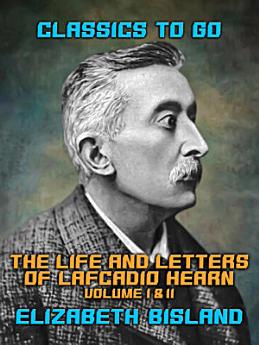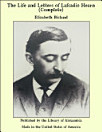The Life and Letters of Lafcadio Hearn Volume I & II
Aug 2021 · Otbebookpublishing
Ebook
732
Pages
family_home
Eligible
info
reportRatings and reviews aren’t verified Learn More
About this ebook
Excerpt: "In the course of the preparation of these volumes there was gradually accumulated so great a number of the letters written by Lafcadio Hearn during twenty-five years of his life, and these letters proved of so interesting a nature, that eventually the plan of the whole work was altered. The original intention was that they should serve only to illuminate the general text of the biography, but as their number and value became more apparent it was evident that to reproduce them in full would make the book both more readable and more illustrative of the character of the man than anything that could possibly be related of him. No biographer could have so vividly pictured the modesty and tender-heartedness, the humour and genius of the man as he has unconsciously revealed these qualities in unstudied communications to his friends. Happily—in these days when the preservation of letters is a rare thing—almost every one to whom he wrote appeared instinctively to treasure—even when he was still unknown—every one of his communications, though here and there regrettable gaps occur, owing to the accidents of changes of residence, three of which, as every one knows, are more destructive of such treasures than a fire. To all of his correspondents who have so generously contributed their treasured letters I wish to express my sincere thanks. Especially is gratitude due to Professor Masanubo Otani, of the Shinshu University of Tōkyō, for the painstaking accuracy and fulness of the information he contributed as to the whole course of Hearn's life in Japan."
About the author
Elizabeth Bisland (1861-1929) was an American journalist, author, and world traveler whose life and work captured the spirit of adventure and intellectual curiosity that defined the late 19th and early 20th centuries. Born in Louisiana, Bisland's early life was marked by the turmoil of the Civil War and Reconstruction, experiences that would later color her nuanced perspectives on American society.Bisland's literary career took off when she moved to New York City, where she became a prominent figure in the literary circles of the Gilded Age. She is perhaps best known for her audacious participation in a race around the world against fellow journalist Nellie Bly in 1889, a journey that not only showcased her adventurous spirit but also highlighted the emerging role of women in journalism and public life.Her writings often explored themes of cultural exchange and the complexities of identity, reflecting her own experiences as a traveler and expatriate. Bisland's essays and articles were widely read, and she was known for her eloquent prose and insightful commentary on contemporary issues.A champion of intellectual freedom and a critic of societal norms, Bisland's work influenced a generation of writers and thinkers. Her friendships with literary figures such as Lafcadio Hearn and her involvement in the literary salons of her time positioned her as a significant, if sometimes overlooked, contributor to American letters.Controversially, Bisland often challenged the status quo, advocating for women's rights and critiquing the materialism of American society. Her legacy is one of intellectual bravery and a relentless pursuit of knowledge, making her a fascinating figure for modern readers interested in the intersections of literature, travel, and social change.
Rate this ebook
Tell us what you think.
Reading information
Smartphones and tablets
Install the Google Play Books app for Android and iPad/iPhone. It syncs automatically with your account and allows you to read online or offline wherever you are.
Laptops and computers
You can listen to audiobooks purchased on Google Play using your computer's web browser.
eReaders and other devices
To read on e-ink devices like Kobo eReaders, you'll need to download a file and transfer it to your device. Follow the detailed Help Center instructions to transfer the files to supported eReaders.






